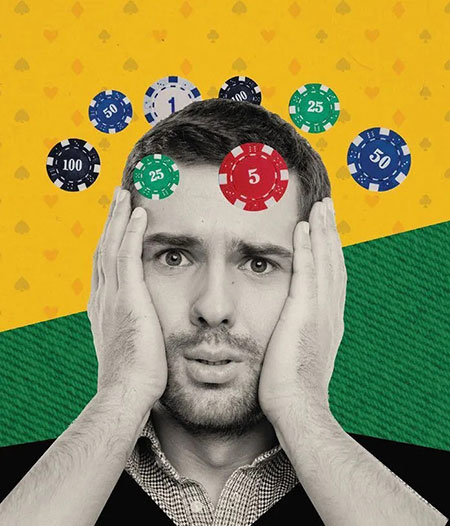THE HARDEST HAND TO PLAY
Knowing when to walk away
By Al O’Grady
 What is the toughest thing to do at the blackjack table? Is it doubling down your 11 against the dealer’s 10? Is it splitting 8’s against the dealer’s ace? Or is it hitting, sticking or doubling down on a soft 18 against the dealer’s two? Your homework assignment for the week is to look at the basic strategy chart to answer each of those questions.
What is the toughest thing to do at the blackjack table? Is it doubling down your 11 against the dealer’s 10? Is it splitting 8’s against the dealer’s ace? Or is it hitting, sticking or doubling down on a soft 18 against the dealer’s two? Your homework assignment for the week is to look at the basic strategy chart to answer each of those questions.
The answer is none of the above. The toughest thing to do at the blackjack table is knowing when to walk away whether you are winning or losing.
There are times when you are on fire at the tables. You can do no wrong. Each time you double down your 11, you get a 10. Each time you split you get two powerful hands. You stick on your 14 against the dealer’s five and he busts. This game is easy. The chips are attracted to you like a magnet. You have doubled your money in 15 minutes. You have visions of quitting your day job and doing this as a full-time career. Why would I want to leave the table now? Does this sound familiar? What inevitably happens? The double downs and the splits stop working. The dealer is making his hands, and you are bleeding chips. You continue to stay at the table believing that pendulum is going to swing back in your favor—after all, it did before. But not only do you give back your winnings, you also give the casino your original buy-in. You keep asking yourself, why didn’t I quit when I was ahead? Again, does this sound familiar?
The reverse is also true. Nothing is working for you. Your double downs and splits are losing. The dealer is making hands on his bust cards, and you find yourself losing your chips in 20 minutes. You tell yourself that this is beyond probability and cannot continue so you buy in for another $500, only to lose that as well. You ask yourself, what have I done to upset the blackjack gods? You go to the ATM to get another $500, convincing yourself that your luck will change, but that money is gone quickly too. What will you tell your wife? If only I read the tea leaves sooner, knowing today was not my day, and left the table when I should have. Again, does this sound familiar?
The casino is a master at manipulating your emotions and clouding your judgment. Hindsight is 20-20 in this game, but you cannot predict the future knowing the precise moment to leave. So how do you do it? You cannot control the future, but you can plan for it. Therefore, you set a goal; you plan and have the self-discipline to walk away when that goal is met.
There are several reasons why people do not do this. The first is ignorance. You must remember that the odds are against you. Some people feel they can honestly beat this game. Unless you are an expert card counter, the long-term prospects do not look encouraging for you. Yes, there are short-term swings, but it is not a long-term reality and the casino knows that. Unfortunately, many players do not. This leads us to the next point —greed.
Many people are inherently greedy. There is a reason why greed is one of the seven deadly sins. People push their luck. They are winning and it feels great. Why would I want to end this euphoria? I have taken too many hits in my life and now it is time for the good life. They are in denial that all good things will eventually come to an end. The “rush” has overtaken them, and they are playing for the thrill and not for the money. Again, casinos are banking on this mentality preventing people from walking away when they should.
If someone says they play to win money, they win money, but they continue to play. They are lying to themselves about their priorities. They are not playing to win money, because if they were, they would leave. They are more interested in playing cards and not the result. They are more interested in the pursuit than the victory. They are playing for the thrill. Psychologists and psychiatrists would have a field day with this one.
On the flip side, why do people continue to play too long when they are losing? Again, there are several reasons for this. First, they do not set a precise loss limit. It can be $100, $200 or $500 depending on your personal financial situation. Play with money you can afford to lose. Yet many disregard this wise notion. Why? Assuming they do not have a gambling problem, which is another discussion for another day, it can be pride, ego or a sense of entitlement.
Some people are bad losers. They refuse to lose and will play at all costs regardless of the financial impact. They let their ego get in the way and somehow justify to themselves that they can chase their losses and get their money back. Unfortunately, in most cases, they lose even more. Pride, which is another one of the seven deadly sins, can also be a contributing factor. Waving the white flag can be a sign of weakness or cowardice. They believe in the saying winners never quit and quitters never win. They want to be a winner; therefore, they never quit. They have a sense of entitlement. If only they could swallow their pride, put their ego on a shelf and come to the realization they are entitled to nothing in this world.
It sounds simple, but it is true. Set a goal, stick to it, and then walk away, win or lose. Everything you do in life is a choice. If you are not walking away when your goal is met, you lack discipline or self-control. Assuming you do not have an addiction, you can make the right choice. You are here for a good time, not a long time. Time is the casino’s friend; it is not yours. Knowing when to walk away is the sign of a winner.
Good luck at the tables and don’t forget to tip the dealer.
Al O’Grady has been a blackjack dealer for over seven years. He is a freelance writer with an economics degree and is currently pursuing a degree in mathematics.


